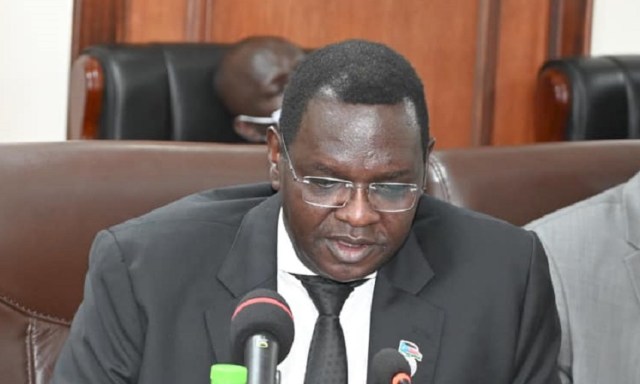By Bida Elly David
Central Bank governor, Johnny Ohisa laments that money laundering and terrorism financing block South Sudan from corresponding with banks in other countries.
The central Bank governor was on Monday responding to concerns raised by lawmakers during an ordinary parliamentary sitting.
Lawmakers complained about the poor progress of national commercial banks compared to foreign banks across the country and outside.
In response, Ohisa said most local banks are too weak and undercapitalized to have a competitive advantage against their foreign counterparts.
“The issue of money laundering and terrorism financing is very rampant in South Sudan. Most correspondent banks have known South Sudan as a politically exposed country,” Ohisa said.
Mr. Ohisa did not, however, clarify his statement on money laundering and terrorism practices in South Sudan.
“When we encouraged our local people to open banks during the boom, everybody went to open banks disregarding the fact that commercial banks require a lot of preparation and government issues,” he noted.
The Central Bank governor said also South Sudan lacks competent experience in handling the banking sector to attract the attention of foreign countries.
“Correspondent banks outside don’t accept relationships with our local banks because of the nature of the ownership of the banks and compliance issues,” he pointed out.
The Bank governor noted that there are so many issues hindering local banks from having correspondent banks.
“Some of the issues are regarding the sanctions or silent sanctions imposed on the country,” Ohisa continued.
He further said mismanagement of finances by the Board of Directors of local banks contributed to the collapse or decline of most institutions and foreign mistrust.
“Here in South Sudan, we have commercial local banks that, even in governance, the chairman is everything; he can take loans any time he wants, and that is why a lot of commercial banks are suffering,” he underlined.
According to Ohisa, it is better to have two registered banks than many that can’t function.
“If I can have three local banks that are big and go everywhere and have branches that can go all over countries, it is better than having 14, 15, or 20 banks that are not capitalized,” he added.
However, Governor Ohisa noted that South Sudan’s joining the financial access task force in charge of anti-money laundering has partially saved the country.
“South Sudan was not a member before; at least now we have been brought to a great list,” he stated.
He disclosed that South Sudan is trying to fulfill the financial working task force to move away from the blacklist.




